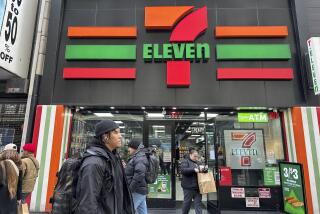Southland Corp. to Consider Defensive Moves as Stock Surges
- Share via
The stock of Southland Corp., the nation’s biggest operator of convenience stores with its 7-Eleven chain and for months the subject of takeover rumors, surged Tuesday after the company disclosed that it is considering various defensive strategies.
With more than 3.3 million shares changing hands, the stock rose $8.875 a share to $64.75 on the New York Stock Exchange, becoming the second-most active in volume and the leader by percentage gain, with a nearly 16% increase.
In a statement early in the day, Dallas-based Southland said: “Like many other companies whose stock is the subject of takeover rumors and has been actively traded, the company has been studying with its advisers various strategic and financial alternatives available to it. . . . There can be no assurance that any transaction will result.”
Terry R. McCord, a Southland spokesman, said the company issued its release at the request of the New York Stock Exchange, which delayed opening of trading in the shares because of an order imbalance.
To investors, the statement appeared to signal a potentially lucrative recapitalization, spinoff or other restructuring--perhaps similar to plans that have been used by Owens-Corning, Harcourt Brace Jovanovich and other recent takeover targets. A recapitalization usually involves paying shareholders a big, one-time dividend and loading the company with debt to make it less attractive.
“I’m sure they’ve defined what they would do if a hostile bid comes,” said Dennis Telzrow, an analyst with the Eppler, Guerin & Turner investment firm in Dallas. “And the market seems to think it’s coming.” Telzrow sees $70 a share as the company’s breakup value and the “minimum bid” for a would-be acquirer.
To be sure, the company--known for such concoctions as Slurpees and such slogans as “Oh, thank heaven for 7-Eleven”--has been the subject of speculation four or five times within the last nine months, noted analyst Edward G. Gagnon of the Rauscher Pierce Refsnes securities firm in Dallas.
Rumors of Suitors
In late May, fresh rumors suggested that the Dart Group, a frequent hostile bidder, was interested in Southland. Other speculation has linked the company with the Belzberg family of Canada; Circle K, a rival convenience store company based in Arizona, and even corporate raider T. Boone Pickens Jr.
Fred E. Wintzer Jr., an analyst with Alex. Brown & Sons in Baltimore, said the company would appeal to a major oil company that wanted to get into the retailing business or to a real estate concern that would sell off chunks of the operation. Southland owns about 25% of its stores and has long-term leases on the rest.
With nearly 7,700 convenience stores, Southland is twice as big as Circle K. The company also owns 463 Chief Auto Parts stores and 163 Quik Mart gasoline stations. It is the nation’s largest independent gasoline retailer and has a half interest in gasoline refining and supply through its Citgo Petroleum. The other half was sold last September to the Venezuelan state-owned oil company in a move designed to reduce earnings volatility and ensure a stable supply of crude oil for Citgo. Southland had bought the company from Occidental for $777 million in 1983, when the refinery business was peaking.
Began as Sideline
Southland was founded in the summer of 1927 by Joe C. Thompson Sr., who operated a group of ice docks in Dallas and started selling items such as eggs, milk and bread so that customers could buy those when they picked up ice for their iceboxes. The company is still run by two of his sons--John P., 61, chairman, and Jere W., 55, president and chief executive.
In the 1960s, the company started to expand beyond Texas and began producing and distributing some of the products sold in its stores, engaging in what analysts call “backward vertical integration.” It also has a large dairy operation and makes food products for companies such as Dole.
For the last year and a half, earnings have been under pressure because of slowdowns in energy-producing and agricultural areas, sharp price cutting and the introduction of new programs at 7-Eleven stores, such as a videocassette rental business called MovieQuik. In recent months, profit margins on the gasoline side have been squeezed by the rising price of crude.
Southland’s net income dipped last year for the first time in 17 years, falling 6% to $200 million, including a one-time gain of $88.6 million on the sale of Citgo’s equity. At the company’s annual meeting in May, Jere Thompson forecast a decline in operating profits for the first half of this year.
SOUTHLAND CORP. AT A GLANCE
Southland is the largest operator and franchiser of convenience stores in the United States, principally through its 7-Eleven stores. Headquartered in Dallas, Southland also operates 463 Chief Auto Parts stores, holds a 50% interest in Citgo Petroleum and is the nation’s largest independent gasoline retailer.
Year ended Dec. 31 1986 1985 1984 Sales (billions) $8.6 $8.6 $8.0 Net income (millions) 200 212 160
Assets $3.4 billion
Employees 67,200
Shares outstanding 48.3 million
52-week price range $44-$64.75
Tuesday close (NYSE) $64.75, up $8.875
More to Read
Inside the business of entertainment
The Wide Shot brings you news, analysis and insights on everything from streaming wars to production — and what it all means for the future.
You may occasionally receive promotional content from the Los Angeles Times.











